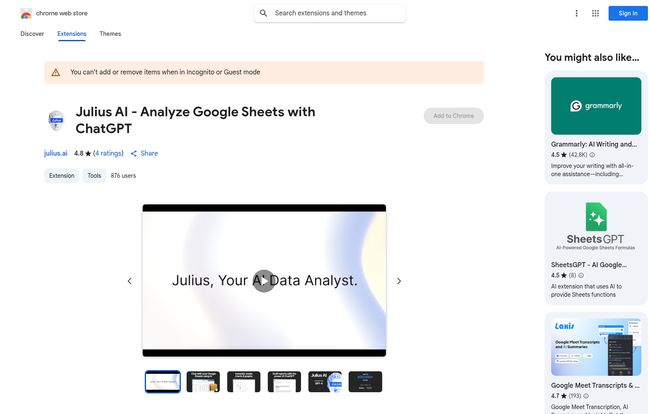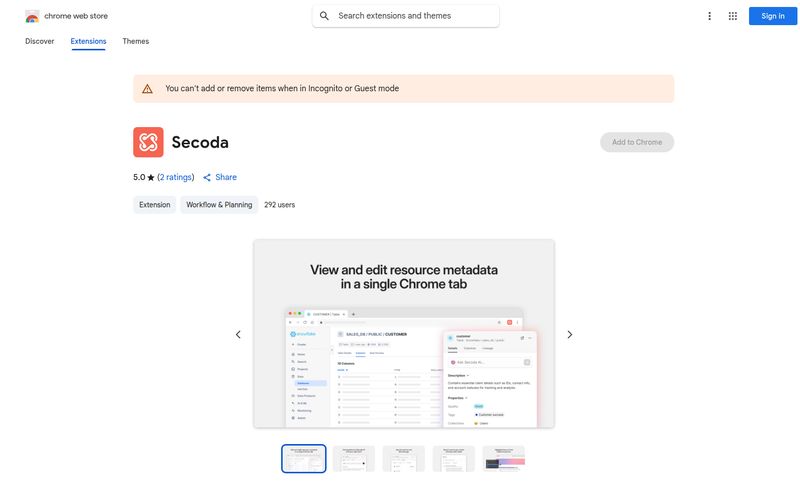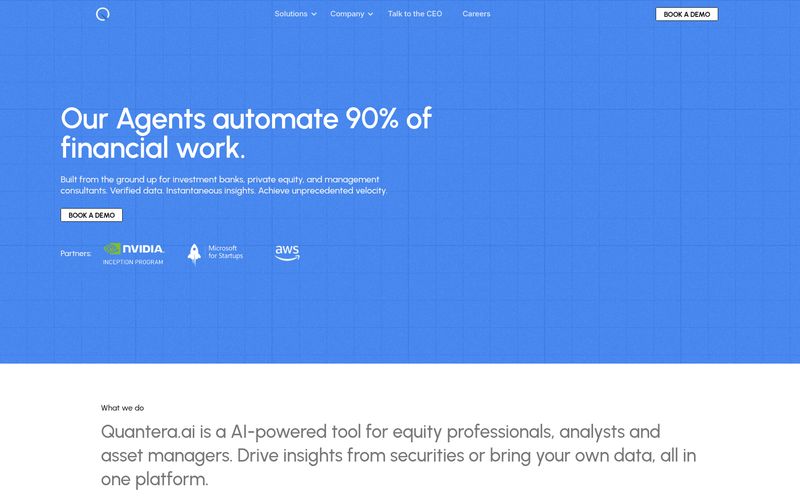If you've ever worked in marketing, sales, or pretty much any desk job in the last twenty years, you've known the unique pain of spreadsheet hell. It's that feeling when you're staring at thousands of rows of data, knowing the answer you need is in there somewhere, but you're one broken VLOOKUP formula away from throwing your laptop out the window.
I've been there. I've lost entire afternoons trying to build a pivot table that made sense. I've tried to learn just enough Python to be dangerous, only to spend hours debugging a single script. So when a new tool pops up on the Chrome Web Store claiming to be my personal "AI data analyst," my curiosity is definitely piqued. But so is my skepticism.
The tool in question is Julius AI. It's a Chrome extension that promises to let you analyze Google Sheets (and other data) using the power of ChatGPT and Anthropic. The pitch is simple: chat with your data, get insights, make graphs. Effortlessly. Is it another overhyped AI gimmick or is it the real deal? I had to find out.
So, What Exactly is This Julius AI Thing?
Think of it like this: Julius AI isn't just a smarter spreadsheet. It aims to be the data analyst you wish you could afford to have on staff 24/7. It combines the number-crunching power you'd normally need Python for, the organizational structure of a spreadsheet, and the conversational intelligence of something like ChatGPT, all into one interface.
You upload a file—be it a CSV from your latest ad campaign, an Excel sheet with sales figures, or even a PDF report—and you just... talk to it. Instead of writing =SUMIF(A2:A100, ">50"), you can ask, "How many of our sales were over $50?". Instead of fumbling with the chart editor for twenty minutes you can say, "Show me a bar chart of sales by region."
This is the magic it promises. It's built on top-tier language models like GPT-4, so the conversational part feels surprisingly natural. It's designed to remove the technical barrier, the syntax, the formulas—the stuff that makes most people's eyes glaze over.

Visit Julius AI
My First Spin with the AI Analyst
Installation was a breeze—it's a Chrome extension, so it's a one-click affair. Simple enough. To give it a fair shake, I grabbed a messy CSV file of some old website traffic data. The kind of file that's just a wall of numbers and text. Notoriously annoying to work with.
I uploaded it to Julius and asked my first question: "Which landing page had the highest bounce rate last month?"
Seconds later, it didn't just spit out a number. It gave me a concise answer in plain English and generated a small table showing the top 5 pages with their bounce rates. No formulas. No pivot tables. It just... worked. I was genuinely impressed. It felt less like I was programming a computer and more like I was delegating a task to a very fast, very nerdy intern.
The Features That Actually Make a Difference
There are a bunch of listed features, but a few really stand out from my initial tests. These are the things that separate it from just having a ChatGPT window open on another screen.
You Can Literally Chat With Your Data
This is the main event. The ability to ask follow-up questions is what makes it feel like a conversation. After finding the pages with high bounce rates, I could immediately ask, "Okay, for those top 3 pages, what were the main traffic sources?" Julius AI remembered the context from the previous question and gave me a new breakdown. Trying to do that in Excel would have been a multi-step, multi-formula process. Here, it was a simple question.
Instant Charts and Visualizations
I hate making charts. I really do. Getting the labels right, picking the right colors, making sure the axes make sense... it's a tedious process. With Julius, asking for a "pie chart of traffic by device type" gave me a clean, usable pie chart in an instant. This feature alone could save me hours every month. It turns data analysis from a chore into something you can do on the fly during a meeting.
A Taste of Real Data Science
This is where things get interesting for the power users. Julius AI can build simple forecasting models. I asked it to "project website traffic for the next three months based on this data." It crunched the numbers and produced a line graph showing historical data and a dotted line for the forecast. Now, is this a replacement for a dedicated data scientist with a PhD? Of course not. But for a small business owner or a marketer who needs a quick-and-dirty projection, this is an incredibly powerful feature that was, until recently, completely inaccessible to non-coders.
The Good, The Bad, and The New
No tool is perfect, especially not a new one. Here’s my breakdown.
On the plus side, it's fast and incredibly user-friendly. The biggest win, for me, is how it consolidates tools. It's a bit of Excel, a dash of Python, and a whole lot of ChatGPT rolled into one. The support for different file formats like CSV, XLSX, and even PDFs is also a huge advantage. Versatility is always a good thing.
On the other hand, we have to acknowledge that Julius AI is still a young product. It’s an early-stage AI lab, as they say. On the Chrome store, it has a fantastic 4.8-star rating, but only from a handful of reviews and under a thousand users. This isn't a flaw, but it means you're an early adopter. You might encounter the occasional quirk or bug. It's part of the territory when you're on the cutting edge. I see it as getting in on the ground floor of something with massive potential.
The All-Important Question of Pricing
So, what’s this going to cost? That's the big question. The Chrome Web Store page is a little coy, simply stating it "Offers in-app purchases." There isn't a clear pricing table listed right there. This is common for new tools figuring out their market fit.
Based on my experience with similar SaaS tools, they're almost certainly running on a freemium or free-trial model. You'll likely get a certain number of free queries or uploads to get a feel for it, with paid tiers for heavy users, advanced features, and higher usage limits. For the most up-to-date information, your best bet is to head straight to the official Julius AI website.
Who Should Give Julius AI a Try?
I can see a few people falling in love with this tool immediately:
- Marketing Managers: Quickly analyze campaign performance, A/B test results, and social media metrics without needing a dedicated analyst.
- Small Business Owners: Track sales trends, inventory, and customer data without getting bogged down in spreadsheets.
- Students and Researchers: A fantastic tool for analyzing survey data or experimental results for a project or paper.
- Data Analysts (yes, even them!): For quick, exploratory data analysis, it can be a massive timesaver to get a first look at a dataset before diving into deeper, code-based work.
It's probably not the right fit for a huge corporation needing to analyze petabytes of data in a secure, on-premise data lake. But for the 99% of us who just want to get quick, intelligent answers from our data, it feels just about right.
Final Thoughts
After spending some time with Julius AI, my initial skepticism has mostly melted away, replaced by a sort of cautious optimism. It's not magic, but it's a seriously impressive application of AI that solves a real, frustrating problem. It makes data analysis more accessible, more intuitive, and frankly, more fun.
It successfully turns the monologue of staring at a spreadsheet into a dialogue with your data. And for that reason alone, I'm excited to see how it grows. It's earned a spot in my digital toolbox.
Frequently Asked Questions
What is Julius AI in simple terms?
Julius AI is an AI-powered data analyst tool, available as a Chrome extension. It lets you upload data files (like Excel, Google Sheets, CSVs) and ask questions in plain English to analyze the data, generate charts, and get insights instantly.
Is Julius AI free to use?
The Chrome Web Store page indicates it offers in-app purchases, which suggests a freemium model. You can likely use it for free with some limitations, with paid plans available for more extensive use and advanced features. Check their official website for current pricing.
What kinds of files work with Julius AI?
It supports a variety of common data formats, including CSV, Excel (XLSX), and even PDF files, making it quite versatile for different types of data analysis tasks.
Do I need to know how to code to use it?
Absolutely not. That's one of its main advantages. It's designed for users who don't know Python or complex Excel formulas. You interact with it using natural language.
How is this different from just using ChatGPT?
While both use advanced AI, Julius AI is a specialized tool built specifically for data analysis. It directly connects to and manipulates your data file, generates visualizations like charts and graphs, and maintains context about your dataset, which is something a general-purpose chatbot can't do as effectively or securely.
Is my data safe with Julius AI?
According to their privacy disclosure on the Chrome Web Store, the developer states that user data is not sold to third parties and is not used or transferred for purposes unrelated to the item's core functionality. As always, you should review the privacy policy for any tool you use with sensitive information.
Reference and Sources
- Julius AI on the Chrome Web Store
- Official Julius AI Website
- Anthropic - AI Safety and Research (One of the AI technologies powering the tool)



